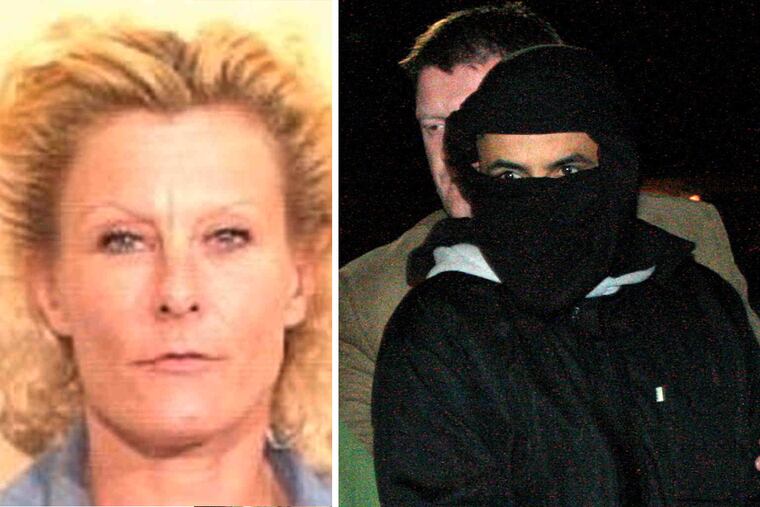Terror suspect in 'Jihad Jane' case extradited to Philly
The Algerian-born terror suspect made his initial appearance in federal court in Philadelphia.

An Algerian-born terror suspect accused of recruiting Colleen "Jihad Jane" LaRose of Montgomery County in a 2009 plot to assassinate a Swedish artist made his first public appearance on U.S. soil Friday in Philadelphia, six years after he was indicted and just hours after his extradition from Spain.
Ali Charaf Damache, 52, is the first foreigner brought to the United States to face terrorism charges under the Trump administration, whose officials – including the president himself – had previously argued that suspects like him ought to be prosecuted in military tribunals rather than civilian courts.
Prior to his removal to the U.S. this week, Damache was in the custody of Spanish authorities, who detained him in a hotel room in Barcelona after receiving a phone tip in December 2015.
But it was unclear whether his appearance Friday in a federal courtroom in Philadelphia signaled a larger policy shift for the Justice Department under President Trump.
Attorney General Jeff Sessions, who was in Philadelphia earlier in the day delivering a speech on "sanctuary cities" at the U.S. Attorney's Office in Center City, betrayed no hint of the major development that would unfold just hours later in the long-dormant terror prosecution.
Sessions has repeatedly argued that terrorism suspects do not deserve the same legal rights as citizens tried in U.S. courts and suggested that trying them within the country's borders would pose a security risk. Instead he has advocated – as recently as during a radio interview in March – that they be held and prosecuted in the U.S. military prison in Guantánamo Bay, Cuba.
Trump also took that position during his campaign last year, vowing at a rally in February 2016 to "load [Guantánamo] up with some bad dudes."
But that rhetoric did not penetrate Damache's brief court appearance Friday, at which the Irish-Algerian dual citizen said little and simply requested that authorities contact the embassy of Ireland to secure legal representation on his behalf. U.S. Magistrate Judge Timothy Rice scheduled his next court hearing for Aug. 28.
Damache, first arrested on unrelated charges in Waterford, Ireland, in 2010, had been fighting extradition since a federal grand jury indicted him a year later on one count each of terrorism conspiracy and attempted identity theft.
Prosecutors here have alleged that Damache recruited several Americans to join a cell he was trying to establish for al-Qaeda in the Islamic Maghreb, which operates in Algeria. Three recruits, including LaRose, have been sentenced prison terms for their involvement.
But in May 2015, an Irish High Court judge refused to extradite Damache to the U.S., citing concerns over U.S. prison conditions. Justice Aileen Donnelly also questioned why Irish authorities had not tried to prosecute him first for his purported crimes. She ordered his release from custody. Ireland's attorney general appealed.
It remains unclear when or why Damache arrived in Spain. Had he remained in Ireland, he likely would have remained free, at least until the resolution of the appeal.
Known by his online moniker "theblackflag," Damache emerged as a shadowy figure in the case against LaRose and her co-defendants — one of the earliest prosecutions in the U.S. of its citizens seeking to aid violent jihadist efforts abroad.
Prosecutors say he used jihadist websites between 2008 and 2011 to recruit light-skinned women and others who did not fit the stereotypical terrorist profile.
His targets included the blonde, blue-eyed LaRose; Jamie Paulin Ramirez, a Hispanic single mother from Colorado; and Mohammad Hassan Khalid, a former high school honors student from Maryland who was, at the time of his guilty plea, the youngest person convicted in the U.S. on terrorism charges.
Together, authorities say, they attempted to recruit more men and women from Europe and the U.S., some of whom would travel to South Asia for explosives training and return to Europe to carry out terrorist attacks.
According to court filings, Damache eventually persuaded LaRose and Ramirez to join him in Ireland, with promises that they would launch an attack on Lars Vilks, a Swedish artist whose work depicting the prophet Muhammad's head on the body of a dog offended some Muslims.
Ramirez, who took her son with her, married Damache the day of her arrival in the country. LaRose became disenchanted and eventually left the group, calling an FBI tip line seeking money to return home.
But at her sentencing hearing in 2014, LaRose still spoke of Damache with admiration.
"I had so much respect for him. I had this emotional attachment to him," she told U.S. District Judge Petrese B. Tucker. "He was so brave."
She was sentenced to 10 years in prison and is serving her term in Tallahassee, Fla. Ramirez was sentenced to eight years. Khalid was released in 2015 after serving his prison term.
Damache could face up to 45 years in prison if convicted.